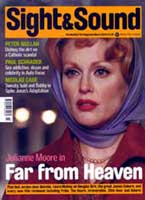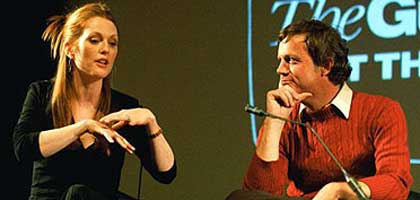
Interview with Todd Haynes

Nick James: I imagined that before making 'Far from Heaven' you might have put the cast through some sort of Douglas Sirk boot camp. The acting style in his films is so different to what modern film actors are used to.
Todd Haynes: That's true. It is such a big acting style. But it's not exactly ironic; there's no winking, no being superior to the text, and there's also no infusing the text with this idea of an innate psychological depth, which is what the Method idea of acting is about. Instead it's about excavation. There's usually something the characters are discovering about themselves, but these characters don't articulate what they learn, and accordingly the dialogue is very much about surface. Everything is on the surface in a way that is not actually comforting in our society today, which is so much defined by psychology.
NJ: How would you define the relationship between yourself and Sirk and irony?
TH: The term irony has become too worn out to be useful. It's become bastardised into an easy cultural catchphrase that doesn't really apply to this film, although a certain distance does. When we think about distance we think about the cutting off of emotion, and it's not that. It's a distance that brings with it a greater emotional reservoir of feeling.
NJ: Did you feel it was the right time to revive Sirk's emotional brand of cinema?
TH: If only at the level of cutting that cynical, ironic stance that is so provided now and so securing to people. It's worrisome to me, especially for younger people who just don't know how to risk feeling emotional about anything too much these days and getting behind even just their gripes with the world. I worry about that, and there's a lot of reason to be revved up right now with the political climate in America. It's just scary how easily things are going in one direction with no dissent being reported or discussed.
NJ: The film tackles some fairly hefty themes head on: racial prejudice, homosexuality...
TH: I was always interested in those things to the degree that they affected the character of Cathy in the movie. But it was definitely only possible to take on so many big defining themes of American culture without her turning into a kind of buffer between the very private and very public parallels going on. [Focusing the film on Cathy] was hard at times because the dramatic curiosity, the 'juice', is with the guys. So I knew I could show one scene with [her husband] Frank in the shrink's office [in which he reveals his homosexuality], and that would be it. As soon as you open the door the tiniest bit more on Frank, it shifts the balance too much toward him because there's incredible curiosity about what's going on in his life. But it also meant playing Frank a little nastier than I might otherwise have done, and I think [Dennis] Quaid did such a beautiful job with that. It's such a human performance. You recognise that kind of behaviour when you're going through some shit and the person around you, your wife or your lover, is trying so hard to be so nice, and you just say the nastiest thing to them and you feel worse, it just compounds the problem. I find that just so recognisable in Quaid's performance, and really courageous in an actor who we think of as so wanting to be liked. And so likeable.
NJ: You've perfectly recreated the sumptuous style of the 1950s 'women's picture'.
TH: It was all from the language of the most beautiful examples of those kind of films we could find, and most of them were Sirk films. It was ultimately an amazing learning process for everyone involved. What's amazing about Sirk is that you look at a film like All That Heaven Allows: it has the smallest themes dramatically of his best-known films, Written on the Wind and Imitation of Life, and yet it wasn't until I pulled digital stills off the DVD and looked at them in isolation that I realised how extreme, almost expressionistic the lighting is. And you don't even remember that when you're watching the film - that language just serves the dramatic needs of the story. It was really like this invitation to a boldness and an extremeness that I wanted everybody to rise to the occasion and learn from him. It isn't just learning a very specific set of terms from a specific time and revelling in how well it's executed, it makes everybody rethink what they have to do: where you put the camera and how you construct angles, the logic of where the light is coming from in one shot and then another. That makes everybody realise that this is a completely plastic medium we're working in. There are no rules, we just make our own set of contemporary rules that we think are innate - and they're not. It's completely arbitrary why you say, "The window's here so there's got to be light coming in from there," - things they just discarded completely at the time. So you learn about the past, but you also learn about the present.
NJ: Does 1950s Hollywood represent something of a golden age for you?
TH: There's a wealth of artistry and ideas in almost any period you decide to settle on and look at, and we could all benefit from doing so. Think of how sophisticated silent film got before the talkies came. It's like an entire universe where the moorings have been cut.
NJ: What's so great about 'Far from Heaven' is that I imagine it would work just as powerfully for audiences who had never heard of Douglas Sirk.
TH: I'm really proud of the movie and I'm really interested in the fact that it plays to the unindoctrinated mainstream sensibility and the highbrow cinéaste world that has shown more of an interest in my work in the past, and is equally respected on both ends. That's just peculiar and great.
NJ: Whereas some of your earlier films bore the marks of the struggle to get them made, this one appears pristine. Was it an easier process this time?
TH: It was incredibly hard. But it didn't have to be as hard as it was. There was such a negative attitude among the financiers and the bond company - incredible concern, worry and freakout about everything we wanted to do. It made [producer] Christine Vachon's job so much harder than it needed to be. It was almost like they were banking on us failing, which is completely unnecessary. It was a weird time at USA Films where there wasn't really a clear leadership, so it was people down below who were making the directives - the pencil pushers. They didn't ever say, "Beautiful dailies, guys," or anything like that. It was just, "You didn't do this or that." It was very negative and it made it really tougher than it should have been. But the creative relationships I formed on the film were amazing.
NJ: What prompted your choice of cinematographer?
TH: I've never worked with Ed Lachman before and he did a magnificent job. I saw a bunch of his films when I was trying to make my final decision, and the thing that was so remarkable about them was that every one of them looked absolutely and totally different. And that's really unusual, even among the greatest cinematographers where you see a kind of stamp, particularly in the lighting. Ed just treats everything initially like a blank canvas, is really an artist about it, and that excited me a great deal.
NJ: Elmer Bernstein's score is also outstanding.
TH: It's excessive and rich and powerful, but the thing about this kind of movie is that muteness in the characters, that lack of psychological articulation, makes the music and the visual language of the film so important
NJ: Bernstein himself was working in Hollywood in the 1950s. Was that a factor in your decision to use him?
TH: I used his score of To Kill a Mockingbird [1962] as the scratch music in the film, and it was beautiful. But when people say, "Elmer Bernstein, how perfect," they forget that he wasn't doing this kind of music in the 50s. It's true he's done just about every genre you can think of since, but the kind of music he was known for at the time [The Man with the Golden Arm etc.] and the kind of world he was living in was this much cooler Marxist, edgy world. But he's just such an amazing man. It is so rare that this happens with a film, when all the elements are really working well together and people are really appreciating that.
